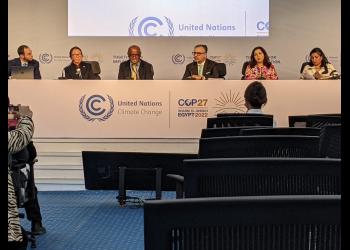Delegates explore needed solidarity and justice dimensions at COP 27
Principles of solidarity and justice—outlined in a statement titled One Planet, One Habitation, re-released this month by the Baha’i International Community (BIC), on humanity’s relationship with the natural world—were explored by government officials, civil society actors, and other leaders of thought, at a press conference hosted by the BIC together with the Buddhist Tzu Chi Foundation at this year’s United Nations Climate Change Conference (COP 27) in Sharm el-Sheikh.
“Humanity has tremendous potential, ingenuity, creativity, and capacity to solve the myriad problems before it,” said BIC Representative Daniel Perell, who moderated the press conference. “These must now be harnessed through determined, collective volition—a resource which, in turn, rests on confidence in humanity's capacity and hope for a better future.”
Also released by the BIC was a companion website to its statement, exploring ways these foundational principles are being translated into reality by communities worldwide, as well as a film, titled Tanna: A Study in Leadership and Action, illustrating the experience of one such community in Vanuatu.
“Our new film is just one of many hopeful anecdotes about youth applying foundational principles such as unity, solidarity, and a desire to create new patterns of relationships within their communities and with their environment,” Mr. Perell observed.
Co-hosting the press conference with the BIC was the Buddhist Tzu Chi Foundation, which emphasizes the need to address climate issues in holistic ways and to examine the values that are at the heart of climate commitments. In prepared remarks, Debra Boudreaux, CEO of the Foundation, noted the role of factors such as interconnection and resilience, along with the need to learn systematically and refine efforts over time. “A goal can be perfect or imperfect,” she said. “The key point is learning from its lessons.”
Speaking from the perspective of a small island developing state, His Excellency Bakoa Kaltongga, Special Envoy on Climate Change in Vanuatu, emphasized the need to transform structures of global governance. In this light, he related his country’s initiative to seek an advisory opinion from the International Court of Justice, clarifying state responsibility for acting on climate change.
“It will provide us a common ground with the greater industrial North and the small island and developing states to … unite together in addressing these climate change challenges,” Mr. Kaltongga said, of the requested opinion.
Payam Akhavan, Professor of International Law at the University of Toronto and counsel to the Commission of Small Island States on Climate Change and International Law, noted the importance of a rules-based international order and values of justice and equity, saying, “The principle that a state should not do harm to other states must become part of the conversation at COP.” Kehkashan Basu, Founder-President of Green Hope Foundation, stressed the importance of grassroots action based on principles of empathy and compassion.
Finally, Bani Dugal, Principal Representative of the BIC, highlighted principles central to the One Planet, One Habitation statement, including the need to redefine notions of progress, to align action with higher principles, and to refashion relationships between individuals, communities, and institutions of governance.
“The world that beckons is one of integration and balance, beauty, and maturity,” Ms. Dugal said. “It is a world increasingly relieved of the destructive moral compromises—social, economic, and environmental—that have so often been asserted as necessary to progress. Movement toward this vision has begun. its momentum is gathering.”
COP 27 brought together over 44,000 registered attendees, including world leaders, civil society and climate activists, as well as journalists and business leaders, to discuss the implementation of the UN’s climate change framework. One of the largest conferences of its kind, the scale represents unprecedented consensus around the concern for climate change as well as a recognition of the power that deliberative settings can serve to stimulate the needed action to maintain the healthy functioning of our global system.
